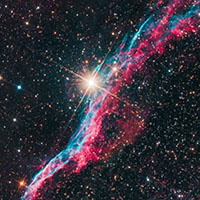5 tips for deep sky astrophotography: How to get started and what you need for gear
posted Tuesday, December 7, 2021 at 2:00 PM EDT

Have you ever wanted to try your hand at deep sky astrophotography? If so, you've probably wondered about the best way to start and what you would need for equipment. B&H recently published a video with photographer Brian Fulda that delivers five tips for aspiring deep sky astrophotographers.
Fulda's first tip is all about gear. What do you need to get started taking deep sky photos? While it's fun to take night sky photos with a tripod, camera and lens – and you can capture amazing shots this way – you will need more gear for 'deep sky' photography. You'll need an equatorial mount. They can be large and complicated, like Fulda's, or smaller and more like a star tracker. You'll need an optic, like a telescope or a telephoto camera lens. You'll also need a camera, of course, which can be your DSLR or mirrorless camera or a dedicated astronomy camera.
Once you have the required equipment, what's the next step? 'Plan, plan and then do some more planning,' says Fulda. You need to plan for four things when doing any astrophotography. You need to plan for location and find a place with a dark sky. You can find dark sky locations using this map. You need to plan for weather. You need to plan for the moon phase, too. A full, or nearly full moon, will wash out the sky and make it hard to photograph stars. If you are hoping to photograph a specific celestial body, you need to photograph it at the right time of year.
In the video above, you can see the rest of Fulda's tips for getting started with deep sky astrophotography. He discusses how to balance your mount, polar alignment and offers tips for when you're in the field.
There's much to learn about astrophotography. B&H has previously shared other great tutorials, including 'How to get started in astrophotography' and 'How to take striking astro photos: 5 astrophotography composition tips.' For longer tutorial videos, as part of the B&H Event Space and Optic 2021, you can also check out 'Level up your astrophotography,' 'Deep space astrophotography from your backyard,' and 'Behind the scenes: Milky Way and night sky photography with Jennifer Wu.'
If you'd like to see more from Brian Fulda, be sure to visit his website and follow him on Instagram.

